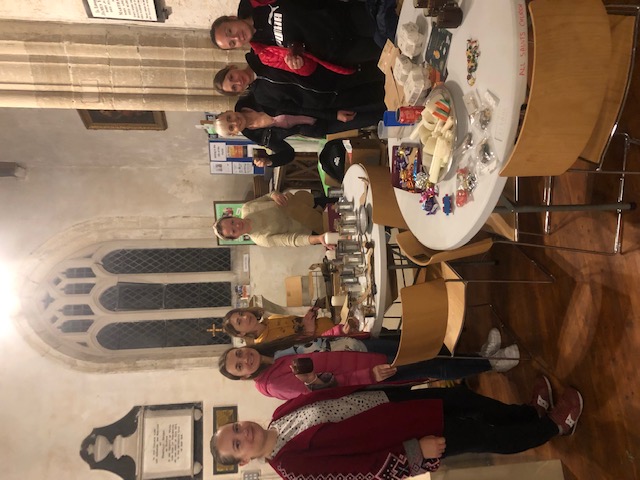This week we sat down with Brother Alasdair Kay, Rector of Wyke Regis, to find out more about his role in helping Ukrainian refugees settle into their new lives in the parish.
Since the Russian invasion of Ukraine in February, nearly one-third of Ukrainians have fled the country as Russian aggression continues.
Shortly after the war broke out, it quickly became clear that millions of Ukrainians would need to seek refuge across Europe, so Wyke Regis took action.
Concerned citizens who wanted to take part in the Homes for Ukraine Scheme met in Weymouth to network and discuss practicalities.
Br Alasdair said: “What came out of that was finding a way of supporting hosts in bringing refugees to England, which was initially highly problematic and very fast-moving – but nonetheless, Ukrainians came in.”
Br Alasdair went on to describe the hostile climate the network was faced with when first attempting to help, coming face to face with the sorts of Government policy that made life challenge for those attempting to come to the UK.
Br Alasdair explained: “Suddenly, there was this huge upsurge of desire coming from people concerned about Ukraine, huge levels of giving relief and emergency funding. I mean, huge amounts of cash were raised. And I think it just put the Government on the back foot.”
Despite the public's outpouring of support, the process of requesting asylum in the UK remained frustrating and complicated, as the Government struggled to keep up with demand.
For Br Alasdair, however, the next stage was obvious; finding safe homes. He said: “I’m the Governor of a local school, and Chaplain of a local secondary school, so I met with the Heads and emphasised the need to get ready as Ukrainians will be coming. People in the community began to open up their homes and second homes.”
He went on to describe the journey of a mother and child who arrived in the parish: "the first thing was getting them to the GP and getting medicated. The mother then slept for about a week! She had walked and carried her child for three days, where she reached Poland, before reaching the UK."
"I've seen film clips on the phone of husbands in bomb shelters for days on end. One family member showed me the pictures of her home with the exploding rocket on a sofa and the windows taken out of the wall. The whole of her area just flattened. Another woman took calls, begging her husband and relatives to get to the bomb shelters.
"It's quite distressing. It's kind of strange where you're in a context of normal life in the West Country, living with people whose loved ones and families are literally going through a living hell."
As time has gone on, Br Alasdair’s role has gradually shifted to helping refugees who have made their way to Weymouth find accommodation, where placements are starting to break down due to financial or social situations.
He said: “Some homeowners who opened up their second homes to Ukrainian refugees lost up to £1,500 a week. Refugees had been living in these houses for six months and the hosts wanted them to move on, but there is little to nowhere for them to move on to."
Amidst this complicated landscape, Br Alasdair has opened the doors to the rectory to take in a second Ukrainian family, until they can find a more permanent place to stay.
However, it is not just safe housing for families that is so essential to secure. Every time a family has to move, there must be schooling available for children.
“That’s where our schools come into play, and as that link between the church and school, I can try to keep stability in place. Just recently we’ve started opening the church Friday evenings to provide a warm dry space for Ukrainians to meet and socially play games. It lets the kids play in a safe space, and allows their parents to open up and sit down for a couple of hours."
In the meantime, the Ukrainian refugees have been doing their utmost to adapt to life in the West Country, including participating in church activities.

“We’ve had a lot of Ukrainian mothers and children come to the services as they’re very kid-friendly, but of course, language is a challenge. It also very different to Orthodox worship, their worship is much more visual and much more sensual than ours.”
“What I do on Friday evening is finish with prayers. We pray, and we light candles, and I put out a couple of icons which I think helps them focus on something. They clearly enjoy the friendliness of the church and certainly come along to the social events.”
Despite all the work being done across the globe, the issue of displaced Ukrainian families is still ongoing, including in our diocese, so, if you can help, please consider working with your local support group:
Dorset - local Facebook group
Dorset News - Ukraine refugees hosts to receive financial boost from Dorset Council
Salisbury - local Facebook group
Sherborne - local Facebook group
Wilts - local Facebook group
Jersey - local Government page
Guernsey - local Government page
If you’ve been hosting Ukrainian guests, or if you’ve been finding other ways to help, let us know by emailing the Communications Team at comms@salisbury.anglican.org.


